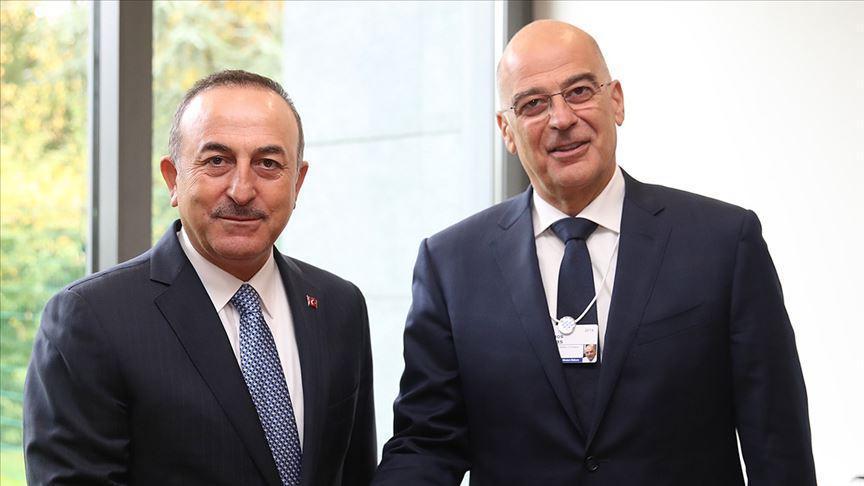
Turkey’s Foreign Minister Mevlüt Çavuşoğlu held a phone conversation with his Greek counterpart Nikos Dendias, state-run Anadolu Agency reported on Dec. 24.
No details of the phone conversation were revealed.
Recently Turkey’s agenda, along with other countries, has been dominated with the deal Ankara struck with Tripoli last month.
On Nov. 27, the foreign ministers of Libya and Turkey sealed the “Marine Jurisdictions” maritime boundary delimitation deal in Istanbul.
This is the second such agreement of Turkey for eastern Mediterranean following its deal with Turkish Cypriots signed in 2011. Turkey has yet to proclaim any exclusive economic zone in the region, which may add a fisheries dimension to the existing oil and gas competition.
The memorandum establishes 18.6 nautical miles of a continental shelf and Exclusive Economic Zone boundary line between Turkey and Libya.
This boundary line was disclosed by the Turkish Foreign Ministry on Dec. 2 in a Twitter message of a senior diplomat responsible for maritime issues, Ambassador Çağatay Erciyes.
Ahead of signing a deal with Libya, Turkey on Nov. 13 sent a letter to the U.N. addressing the secretary-general and reaffirmed the outer limits of its continental shelf in the eastern Mediterranean.
The coordinates agreed with Libya coincide with the legal position expressed in that letter and are fully compatible with international law, including the U.N. Convention on the Law of the Sea (UNCLOS), the diplomat noted.
Turkey argues that the islands which lie on the opposite side of the median line between two mainlands cannot create maritime jurisdiction areas. Turkey also highlights the importance of comparative coastal lengths and the principle of equitable delimitation. Accordingly, it argues that the Greek islands and the western front of Cyprus should not be given any maritime jurisdiction other than territorial waters.
Turkey has been in talks with Libyan authorities for a maritime boundaries agreement since 2009, even in the period of Muammar Gaddafi’s rule, the diplomat noted, stressing that this strategy has not come upon most recent developments in the eastern Mediterranean.
Libya, an oil-rich country, has remained beset by turmoil since 2011 when Gaddafi was ousted and killed in a NATO-backed uprising after four decades in power.
Ankara open to dialogue with Athens on Med Sea
In an interview with a Greek newspaper, the Turkish top diplomat said Turkey is ready to hold talks with Greece regarding the issues in the eastern Mediterranean.
“We have openly conveyed to Prime Minister Kyriakos Mitsotakis that we stand ready to start discussing issues of the eastern Mediterranean. We have been bringing this offer up for a while now. Hopefully, the new Greek government will respond positively,” he told Greek newspaper To Vima.
Çavuşoğlu’s interview was before his phone conversation with Dendias.
The minister also urged Athens not to take any unilateral steps it had taken before. He added that “avoiding dialogue with Turkey while counting on the blind support of the EU” would be the “biggest obstacle” to resolving the issue.
“Such attitude by the Greek Cypriots has proven to be counter-productive beyond any doubt in terms of the Cyprus problem so far,” he said.
“Unfortunately, our calls for dialogue have fallen on deaf ears. Most littoral countries of the eastern Mediterranean ignored our calls and chose to proceed unilaterally,” Çavuşoğlu underlined.
Stressing that only Libya had responded to Turkey’s calls for dialogue, he said Ankara had recently signed a pact with the Tripoli-based U.N.-recognized Government of National Accord GNA “to eliminate the uncertainty” concerning Turkey’s maritime jurisdiction areas.
He also said that the Turkey-Libya pact is in full compliance with international law and respects the fundamental norms of maritime boundary delimitation.
He added that the GNA is the only legitimate authority in Libya to conclude international agreements.
“They [GNA] have signed similar memoranda with other countries, such as the MoU with Italy in 2018 and in 2019, U.S. in 2018 and in 2019, EU in 2018 and Niger in 2019,” said Çavuşoğlu.
He underlined that shifts in the political balance in Libya would have no effect on Turkey’s position on the maritime frontiers agreed upon in its deal with Tripoli.
Since the ouster of the late leader Gaddafi in 2011, two seats of power have emerged in Libya: One in eastern Libya supported mainly by Egypt and the United Arab Emirates, and another in Tripoli, which enjoys U.N. and international recognition.
“Furthermore, according to the Libyan law, an MoU can enter into force by the approval of the Presidency Council. This approval process has already taken place. Thus, the MoU is completely legal and valid. Any change that could occur in the political scene in Libya will not affect Turkey’s position,” he said.
Warning the Greek leadership to follow fundamental norms on maritime boundaries, Çavuşoğlu added, “With regards to the rights of islands to all maritime zones, one shall understand that this is a restricted entitlement, instead of being an automatic one when it comes to the delimitation of maritime boundaries. Unfortunately, the Greek leadership and public opinion tend to disregard this fundamental norm.”